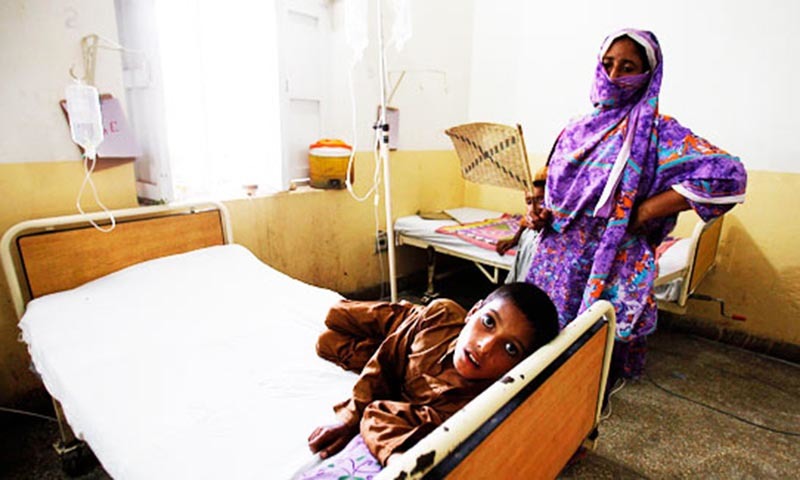KARACHI: Clean drinking water and better sanitation — the two key reasons whose absence exacerbate health indicators and spread diarrhoea — are still hard to come by in Sindh, it emerged on Sunday.
Diarrhoea continued to hit children in many Sindh districts, including Khairpur Mirs from where the Sindh chief minister was elected, which failed to improve sanitary conditions.
Take a look: Gates to give $500m to fight malaria, other diseases
According to official figures sent by several public sector hospitals to the provincial health department, more than 150,000 cases of diarrhoea were reported in 2014, which was a few thousand more than what the province recorded last year.
The disease had killed 15 people in 2014. Thirteen people died of diarrhoea in 2013, said an official.
Majority of these cases were reported from the Tharparkar, Mirpurkhas, Hyderabad, Benazirabad and Khairpur Mirs districts.
Officials said that the number of such cases in Karachi was less than the rest of the province thanks to a relatively better sanitation and sewerage system.
Also read: Pakistan among top five diarrhoea death victims
A senior official said most diarrhoea cases had been reported during the last summer.
He said Karachi had relatively better chlorination and filtration unlike other districts where the situation was very poor.
There were filtration plants in Karachi, while the single filtration plant in Hyderabad wais non-functional. No such plant was installed in any other city of Sindh, said an official, who had extensively worked on the subject.
He said that the key factor behind the consistent prevalence of diarrhoea and other waterborne diseases was the government’s policy of not investing on preventive methods.
“We have sent several proposals for the installation of filtration plants and replacement of age-old water and sewerage lines from most of the cities, but all those plans are delayed since,” he added.
Residents in Hyderabad, the second largest city of Sindh, and Mirpurkhas, are being supplied unfiltered, raw water, causing health problems and extra load that consequently adds to the burden on the provincial health budget.
The officials said water samples collected from Hyderabad for many years running showed the water supplied was not fit for human consumption.
They said elsewhere in the world water supply and sewage lines were placed on either side of a given street, but not in Sindh where both lines go together in every city thus sewage generally mixed up with drinking water and caused waterborne diseases.
Besides contaminated drinking water, inadequate sanitation is another key reason of diarrhoea.
According to the United Nations, about 2.5 billion people do not have access to adequate sanitation and about 1bn people practice open defecation, which causes diseases.
Each year, more than 800,000 children under the age of five die from diarrhoea.
In Pakistan, diarrhoea is the leading cause of infant and child deaths.
Sindh leads with both the highest number of cases of diarrhoea as well as the highest number of deaths of under five (85 per 1,000), according to independent surveys.
Experts said globally fewer number of children die before their fifth birthday but in Pakistan the rate was much higher than what the average global rate was two decades ago.
As 2015 has already unveiled itself, Pakistan still struggles to be able to meet millennium development goal 4, by the end of this year Pakistan needs to slash down the under-five mortality rate by 50 per cent, which is almost impossible, the experts believed.
Published in Dawn, January 12th, 2015
On a mobile phone? Get the Dawn Mobile App: Apple Store | Google Play















































